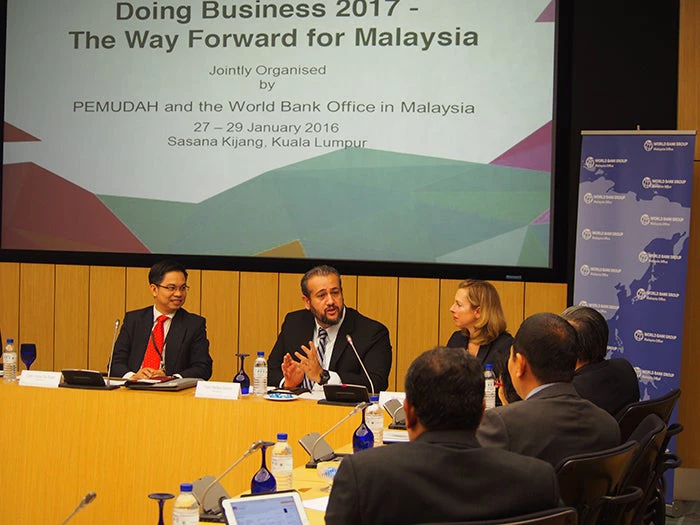Have you ever felt like you are in a race and each time you pass another competitor, more keep showing up ahead on the race track in an endless marathon? Well, countries striving to be competitive face a similar predicament. No matter how hard they try to improve their competitiveness, cut the red tape and reduce burdensome regulations, other countries are doing the same, but even quicker.
Malaysia is already a very competitive country. Today it ranks 18 out of 189 economies in the World Bank Group’s Doing Business Index. Yet, its ambition is to become more competitive. And it wants to overtake some countries on the way up. Malaysia has long recognized that a concerted cross-ministerial and public-private collaboration is needed to do just that.
Malaysia’s Special Task Force to Facilitate Business (PEMUDAH), was established in 2007 to improve the ease of doing business in Malaysia. Testament to its success was Malaysia’s surge to 6 th position in the 2014 Doing Business, up from 12 th place in 2013 and 18 th in 2012, placing it in the same league as Singapore, Hong Kong, and the United States. But since then, Malaysia has been challenged to keep up with the rapid pace of business reforms across the globe.

This week, the newly established World Bank Group Knowledge and Research Hub in Kuala Lumpur partnered with PEMUDAH to convene global experts and Malaysian policymakers for the first joint workshop on the Doing Business methodology. This event represents a unique effort to leverage and draw on the global knowledge from across the World Bank Group, including from the Development Economics Global Indicators Group and global practices covering trade and competitiveness, governance, fiscal management, finance and others.
Experts on the different indicators covered by Doing Business presented the rationale for them, how they are compiled and what they measure. These indicators include such measures as how long it takes to start a business, the ease of cross-border trade, access to credit, registering property, resolving insolvency and paying taxes. National and regional policymakers engaged with these experts to better understand how Malaysia can reach the very top of the list for ease of doing business. They discussed areas that could be improved, notably around resolving insolvency, enforcing contracts, getting credit or registering property.
The World Bank Group can add value to Malaysia’s quest to become one of the world’s most competitive countries through its new Knowledge and Research Hub in Kuala Lumpur, which serves as a global platform to share Malaysia’s experiences and create new cutting-edge policy research on pertinent competitiveness issues.
In addition to Doing Business, there is a wealth of data being collected for different global projects operating out of the new Malaysia knowledge hub, notably, the Enterprise Surveys, Benchmarking Public Procurement, Enabling the Business of Agriculture, Women, Business and the Law, and the Subnational Doing Business reports to name but a few. These capture different aspects of competitiveness and fill some gaps that Doing Business does not cover, providing a nuanced picture.
Over 80 governments have used global benchmarks to stimulate and complement competitiveness reform programs. PEMUDAH is already working on supporting a number of specific interventions to remove obstacles to business operation. Keep running, Malaysia!
Malaysia is already a very competitive country. Today it ranks 18 out of 189 economies in the World Bank Group’s Doing Business Index. Yet, its ambition is to become more competitive. And it wants to overtake some countries on the way up. Malaysia has long recognized that a concerted cross-ministerial and public-private collaboration is needed to do just that.
Malaysia’s Special Task Force to Facilitate Business (PEMUDAH), was established in 2007 to improve the ease of doing business in Malaysia. Testament to its success was Malaysia’s surge to 6 th position in the 2014 Doing Business, up from 12 th place in 2013 and 18 th in 2012, placing it in the same league as Singapore, Hong Kong, and the United States. But since then, Malaysia has been challenged to keep up with the rapid pace of business reforms across the globe.

This week, the newly established World Bank Group Knowledge and Research Hub in Kuala Lumpur partnered with PEMUDAH to convene global experts and Malaysian policymakers for the first joint workshop on the Doing Business methodology. This event represents a unique effort to leverage and draw on the global knowledge from across the World Bank Group, including from the Development Economics Global Indicators Group and global practices covering trade and competitiveness, governance, fiscal management, finance and others.
Experts on the different indicators covered by Doing Business presented the rationale for them, how they are compiled and what they measure. These indicators include such measures as how long it takes to start a business, the ease of cross-border trade, access to credit, registering property, resolving insolvency and paying taxes. National and regional policymakers engaged with these experts to better understand how Malaysia can reach the very top of the list for ease of doing business. They discussed areas that could be improved, notably around resolving insolvency, enforcing contracts, getting credit or registering property.
The World Bank Group can add value to Malaysia’s quest to become one of the world’s most competitive countries through its new Knowledge and Research Hub in Kuala Lumpur, which serves as a global platform to share Malaysia’s experiences and create new cutting-edge policy research on pertinent competitiveness issues.
In addition to Doing Business, there is a wealth of data being collected for different global projects operating out of the new Malaysia knowledge hub, notably, the Enterprise Surveys, Benchmarking Public Procurement, Enabling the Business of Agriculture, Women, Business and the Law, and the Subnational Doing Business reports to name but a few. These capture different aspects of competitiveness and fill some gaps that Doing Business does not cover, providing a nuanced picture.
Over 80 governments have used global benchmarks to stimulate and complement competitiveness reform programs. PEMUDAH is already working on supporting a number of specific interventions to remove obstacles to business operation. Keep running, Malaysia!


Join the Conversation